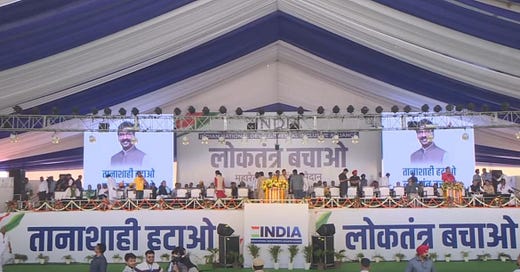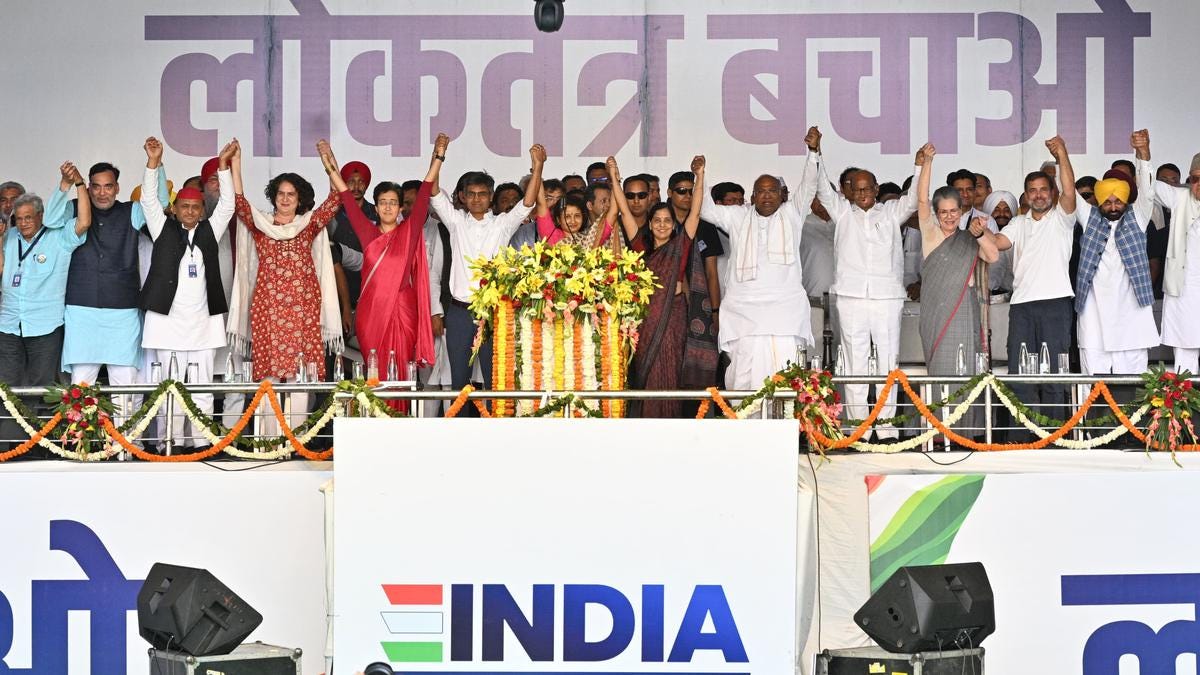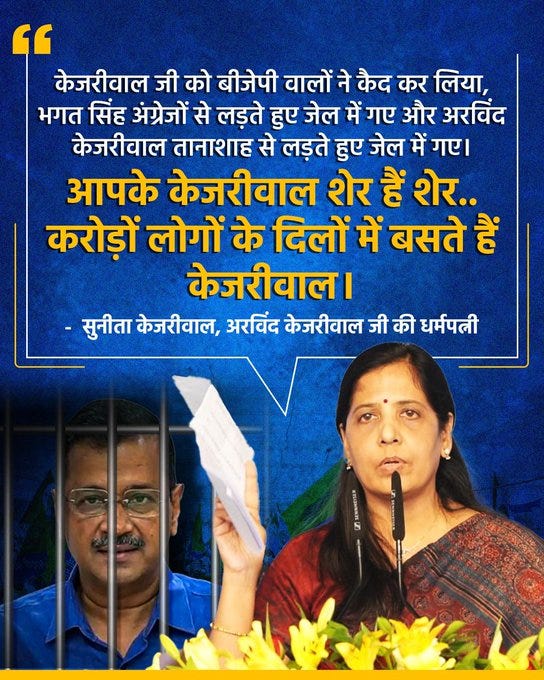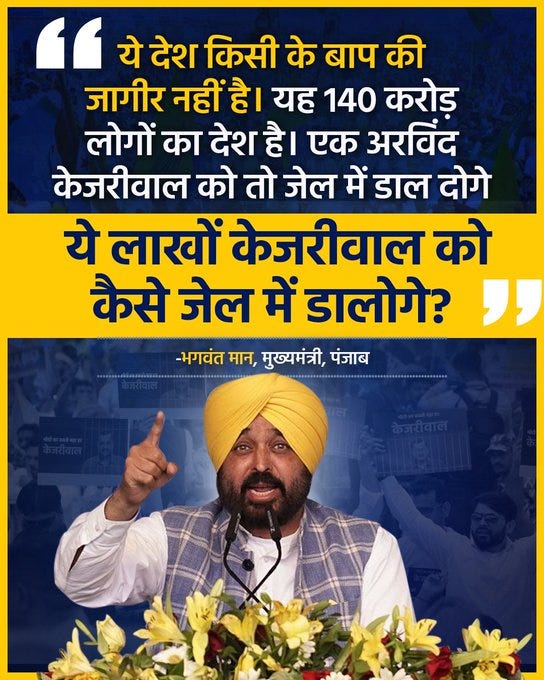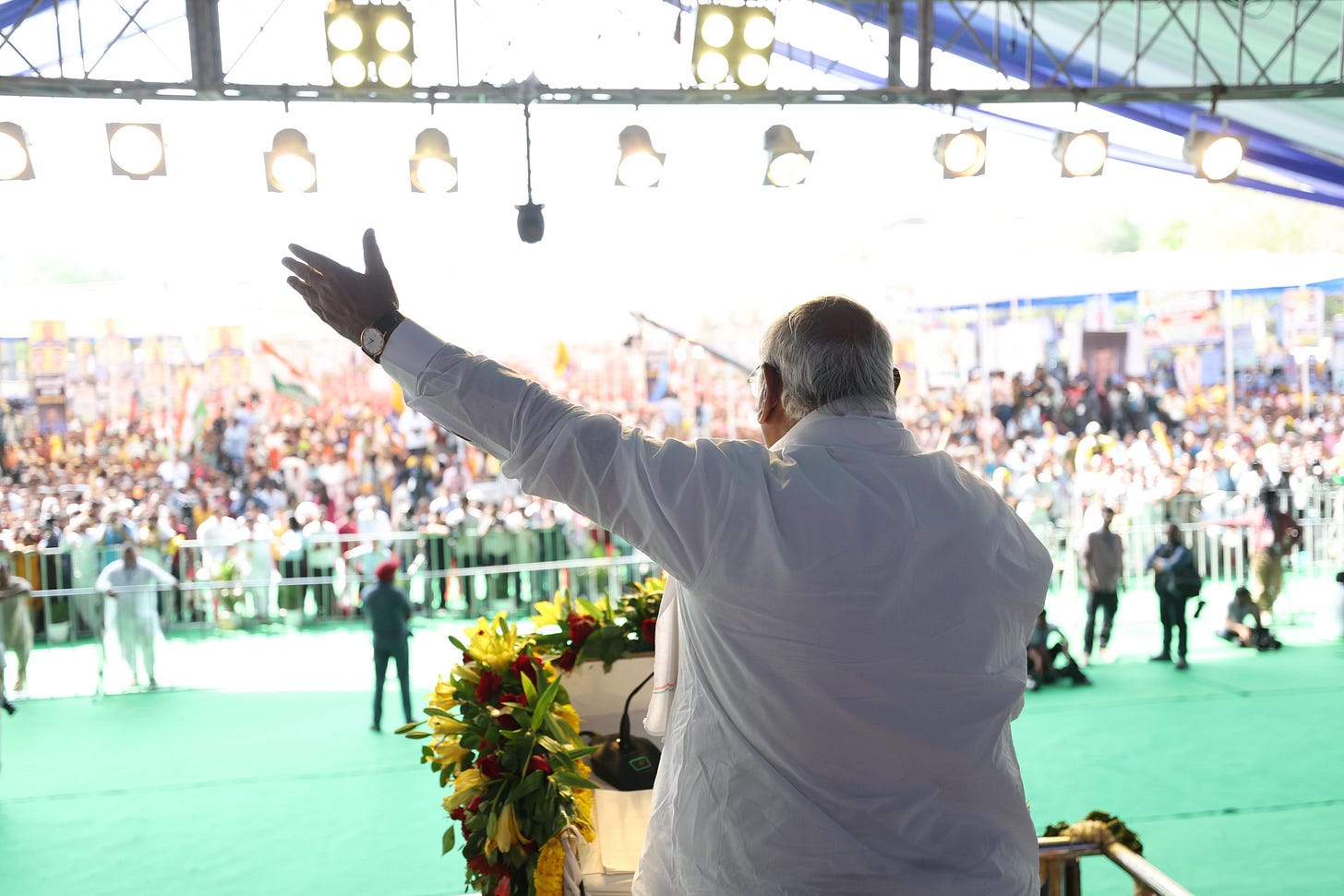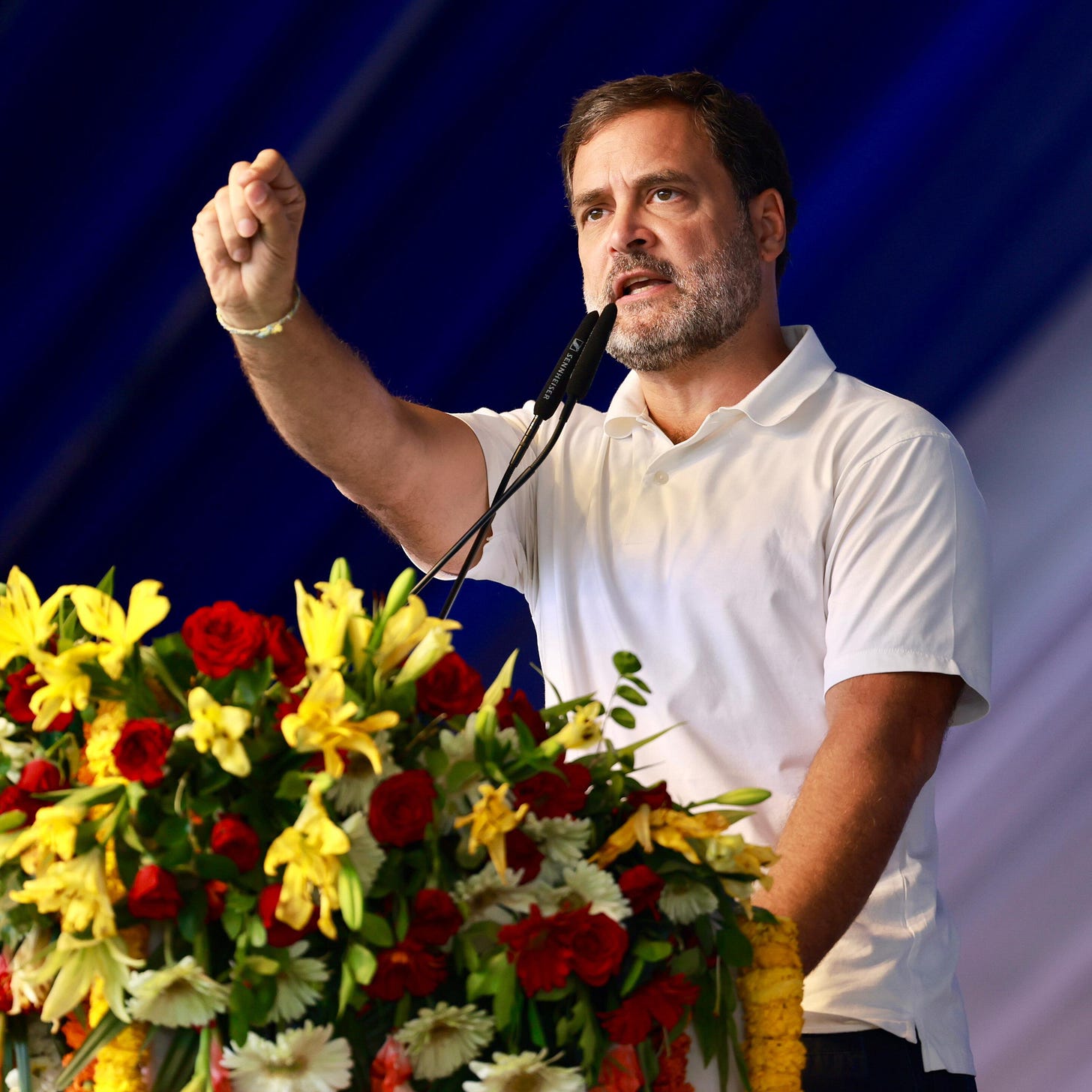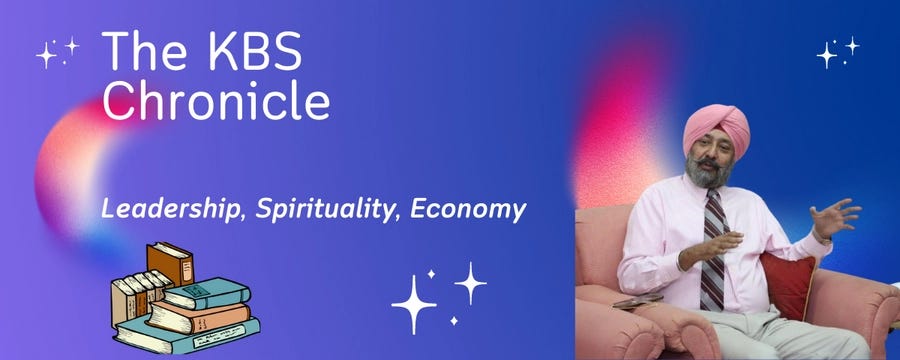Opposition Maha Rally: Our 10 Takeaways
Reporting beyond the headlines and "X" tweets; insights that the traditional media chooses to miss.
Opposition Maha Rally at Ramlila Grounds
In the heart of Delhi, a sea of voices and banners flooded the Ramlila grounds, painting a tableau of unity and dissent against the backdrop of India's political theatre. The event, dubbed a "Maha Rally" by participants and observers alike, marked a significant moment in India's opposition politics. Spearheaded by the Aam Aadmi Party (AAP) and supported by a phalanx of opposition parties, especially the Indian National Congress, this congregation was not merely a protest but what the organisers describe as a clarion call for “restoration of democracy”, signalling the beginning of a concerted effort to challenge the Bharatiya Janata Party (BJP)'s dominance under Prime Minister Narendra Modi's leadership. As the dust settles on this significant gathering, the narratives woven into the fabric of the rally offer insights into the dynamics of Indian politics as the nation edges closer to the 2024 Lok Sabha elections. The intent here is not to rehash the proceedings but to distil ten key insights from this large gathering, offering readers a lens through which to view the unfolding political landscape.
1. Democratic Resilience: The Rally's Reflection on Indian Democracy
Ironically, the very occurrence of the Maha Rally on Delhi's Ramlila grounds amidst the stringent purview of the election code of conduct stands as a resolute testament to the vibrancy and resilience of democracy in India. This event, marred by controversies over its objectives and the political figures it aimed to support, inadvertently highlighted a broader narrative: the unassailable health of democratic practices in the nation. The permission to hold such a significant political gathering, despite the prevailing restrictions, not only contradicts the allegations of democratic erosion levied by opposition entities but also affirms the enduring strength and openness of India's political and civic space. This phenomenon serves as a powerful reminder that, regardless of the myriad voices of dissent, the foundational democratic ethos of India remains robust, enabling a diverse spectrum of political expressions and engagements within its constitutional framework.
2. Magnanimity in Politics: Sonia Gandhi's Easter Participation
The gracious presence of Sonia Gandhi, the leader of the Congress Parliamentary Party, at the Maha Rally on Easter Sunday—a day of profound significance for Roman Catholics worldwide—exemplifies the essence of political magnanimity and the art of the possible in the complex tapestry of Indian politics. This act of participation, despite the day's religious importance to her, underscores a profound commitment to collective opposition goals over personal beliefs or conveniences. Furthermore, her attendance gains additional significance considering the historical backdrop of acrimonious exchanges and personal attacks directed at the Gandhi family and the Congress Party by Arvind Kejriwal, the Chief Minister of Delhi and a key figure in the rally's organization.
Sonia Gandhi's decision to set aside past grievances and join hands with erstwhile adversaries on such a crucial platform vividly illustrates the dynamic and often unpredictable nature of political alliances and opposition in India. It highlights a strategic pivot towards unity in diversity, emphasizing the broader objectives of democracy and governance over individual differences and past conflicts. This moment of convergence, amidst the political and personal complexities, serves as a testament to the enduring spirit of dialogue and collaboration that defines the art of politics in the world's largest democracy.
3. Unity in Question: The Conspicuous Absence of Mamata Banerjee
The notable absence of West Bengal's Chief Minister and Trinamool Congress (TMC) supremo, Mamata Banerjee, from the Maha Rally casts a lingering shadow over the touted unity of the INDIA bloc. Despite the representation of her party by Derek O'Brien, the former quiz master and a sitting Rajya Sabha Member, his presence could not compensate for the absence of Banerjee, whose political stature and influence are unparalleled within the TMC and beyond. Banerjee's decision to skip the rally, especially after having announced the TMC's 42 candidates for all Lok Sabha constituencies in West Bengal, raises questions about the cohesion and collective resolve of the opposition parties forming the INDIA alliance. While O'Brien's participation signifies the TMC's nominal alignment with the opposition's cause, the absence of Banerjee, a formidable force in Indian politics, underscores the challenges of maintaining a united front against the ruling BJP. This scenario highlights the complexities of political alliances in India, where individual ambitions and regional dynamics often influence broader national coalitions, potentially impacting their effectiveness and unity in the face of electoral contests.
4. Empowerment and Empathy: The Symbolic Presence of the Two Wives
The participation of Sunita Kejriwal and Kalpana Soren, wives of the incarcerated AAP leader Arvind Kejriwal and the recently deposed Jharkhand CM Hemant Soren respectively, at the Maha Rally was not just a strategic move to garner sympathy from the electorate but also a powerful demonstration of "Nari Shakti" (women's power). This poignant gesture came in the wake of Rahul Gandhi's controversial remarks, inadvertently setting the stage for a profound display of female empowerment within the political arena. Both women, through their articulate and impassioned speeches, transcended their perceived roles as mere supportive figures to their husbands. They emerged as formidable political entities in their own right, embodying the strength and resilience that define their journeys alongside their spouses. This moment of visibility for Sunita Kejriwal and Kalpana Soren highlighted the evolving landscape of Indian politics, where women are increasingly asserting their space and voice, challenging traditional norms and demonstrating that they are indeed equal partners in the political odyssey, navigating its triumphs and tribulations with unwavering resolve.
Sunita Kejriwal
Sunita Kejriwal presented a compelling message from Arvind Kejriwal, underscoring his unwavering spirit despite his current detention. She reinforced the belief that imprisonment cannot dim his resolve, echoing the widespread support he garners from the Indian populace. Articulating his aspirations for a rejuvenated India, she outlined six key electoral commitments aimed at realizing this vision, encapsulating the essence of their shared dream for the nation's future.
Uninterrupted access to electricity and no power cuts.
Free electricity for the poor.
Revolutionizing education.
Universal healthcare.
Fair prices for farmers.
Granting full statehood to Delhi.
She also mentioned that these guarantees would be fulfilled in the next five years and has prepared a plan to cater to the financial requirements in the process. Sunita thanked everyone for their support and expressed her belief that this dictatorship will end.
Kalpana Soren
Mrs. Kalpana Soren delivered a powerful call to action, urging support for the INDIA bloc in the upcoming Lok Sabha elections as a pivotal move to safeguard democracy. She defended her husband, Hemant Soren, and Arvind Kejriwal, asserting the allegations against them were baseless, and emphasized the people's vote as the ultimate judiciary. Expressing gratitude towards the rally's attendees, she highlighted the supremacy of the citizens over any political entity and advocated for unity within the opposition to counteract threats to democracy. Additionally, she critiqued the BJP's 'Modi ki guarantee' campaign, rallying for public mobilization in defense of democratic values.
5. Charismatic Resonance: Priyanka Gandhi's Rallying Cry
Priyanka Gandhi Vadra, with her unmistakable charisma, once again captivated the audience at the Maha Rally, echoing the legacy of her grandmother, former Prime Minister Indira Gandhi. Utilizing the potent analogy of Lord Rama's exile—devoid of arms, army, or resources, yet triumphing over the formidable Ravana to rescue his beloved wife Sita—Priyanka effectively wove a narrative that resonated deeply with the cultural and spiritual ethos of the Indian populace. This narrative was strategically employed to counter the political capital Prime Minister Narendra Modi might have garnered from the recent inauguration and consecration of the Ram Mandir in Ayodhya.
Given the rally's location at the Ramlila grounds, the analogy not only underscored the relevance of moral and ethical fortitude over material power but also struck a chord with the attendees, highlighting the symbolic battle against perceived injustices and adversities. Priyanka Gandhi's speech, rich in metaphor and imbued with historical and cultural references, not only energized the crowd but also articulated a compelling vision of resistance and hope, challenging the prevailing political narratives and asserting a poignant counter-narrative in the heart of the capital.
6. Wit and Wisdom: Bhagwant Mann's Eloquent Appeal
Punjab Chief Minister Bhagwant Mann, leveraging his previous background as a professional comedian, delivered a speech at the Maha Rally that epitomized the adage "brevity is the soul of wit." With succinct eloquence, he took aim at Prime Minister Modi, urging an end to the divisive politics of caste, creed, gender, geography, language, and lineage. Mann skillfully kept the spotlight on his mentor, Arvind Kejriwal, posing a rhetorical challenge to the forces that seek to suppress dissent: "You may jail him, but how will you jail his ideology and the legions of youth who have embraced his ideals?" His speech, adorned with pithy couplets, culminated in the rousing slogan of "Jo Bole So Nihal," eliciting a thunderous response of "Sat Sri Akal" from the crowd. This not only demonstrated his remarkable ability to connect with the audience but also earned him admiration from fellow speakers on the dais. Mann's performance at the rally underscored the power of impactful communication, blending wit with political acumen to deliver a message that was both inspiring and unifying.
7. Silent Testimony: The Eloquence of Two Empty Chairs
At the Maha Rally, two conspicuously empty chairs stood as a silent but potent symbol of the absence of Arvind Kejriwal and Hemant Soren, both detained by the Enforcement Directorate. These vacant seats were not mere absences; they were a deliberate design to underscore the narrative of injustice, portraying these key opposition figures as unjustly silenced in the lead-up to the Lok Sabha elections. This visual metaphor, amplified by the rally's live webcast and telecast, served as a continual, mute but eloquent reminder of the opposition's charge against the ruling BJP—alleging an attempt to muzzle free speech and stifle political dissent. The empty chairs resonated deeply with the attendees and viewers alike, transforming from mere furniture into a poignant commentary on the state of political freedom and the perceived efforts to undermine it. This imagery, stark and evocative, highlighted the rally's underlying message: the necessity of safeguarding democratic principles and the right to dissent, especially in the crucible of electoral politics.
8. Strategic Manoeuvres: The Congress-AAP Punjab Conundrum
In a notable moment at the Maha Rally, Congress President Mallikarjun Kharge's public gesture towards Punjab Chief Minister Bhagwant Mann underscored a significant political overture, highlighting the intricate dance of alliance politics in Punjab. Despite the Aam Aadmi Party (AAP) holding the reins of power in Punjab and achieving a mutual understanding with Congress in other states like Delhi, Haryana, Gujarat, and Goa, the anticipated alliance in Punjab remains elusive. With AAP having announced candidates for nearly half of the 13 Lok Sabha seats in Punjab, and Mann's bold assertion of contesting and winning "13+1" seats—including the Union Territory of Chandigarh—the stage is set for a compelling political drama. Meanwhile, Congress's delay in announcing its candidates adds another layer of suspense to this unfolding narrative. This situation encapsulates the fluid nature of political alliances, where strategic interests and electoral calculations constantly shift, making the potential collaboration between Congress and AAP in Punjab a focal point of intrigue. As both parties navigate these complex dynamics, the eventual outcome will undoubtedly have significant implications for their respective fortunes in the upcoming elections, embodying the adage that, indeed, politics is the art of the possible.
9. Tentative Alliances: The Regional Powerhouses at the Rally
The presence of political heavyweights from Bihar, Uttar Pradesh, and Maharashtra at the Maha Rally—Akhilesh Yadav, Sharad Pawar, Uddhav Thackeray and Tejashwi Yadav—signifies a tentative but promising stride towards opposition unity against the BJP juggernaut. Despite their robust representation, the details of their respective alliances with the Congress remain unresolved, highlighting the intricate balancing act these leaders face in preserving their regional vote banks while aligning with national opposition initiatives. Their participation underscores the critical importance of regional parties in shaping the broader anti-BJP coalition, reflecting a shared recognition of the need to present a united front. However, the underlying complexities of electoral politics in their home states pose significant challenges to forging these alliances. Each leader's strategy is informed by the imperative to maintain their political base and influence, illustrating the delicate negotiations involved in aligning diverse political agendas. The convergence of these leaders at the rally, therefore, not only augurs well for opposition unity but also signals the ongoing efforts to reconcile the ambitious objectives of national coalition politics with the realities of regional power dynamics.
10. Unmet Expectations: Rahul Gandhi's Rally Speech
Rahul Gandhi's address at the INDIA bloc's 'Maha Rally' at Ramlila Maidan, while focusing on critical issues such as the safeguarding of democracy, the alleged misuse of central probe agencies against opposition leaders, and the BJP's purported dictatorial regime, failed to resonate with the audience as expected. His accusations of the country being run by a "criminal gang" and his emphasis on non-person-specific issues aimed at saving the Constitution, democracy, and addressing unemployment, inflation, and poverty, were seen as retreads of familiar criticisms, lacking the fervour and passion necessary to galvanize the crowd. This perceived lack of new insights or a compelling delivery led to a palpable sense of disappointment among attendees, underscoring a missed opportunity to sway public sentiment significantly. Additionally, the absence of Punjab Congress leaders from the stage or its vicinity was notably conspicuous, further diluting the impact of his speech and highlighting potential dissonances within the party's ranks at a critical juncture of opposition unity and mobilization.
Counterpoint in Meerut: PM Modi's Rally with Distinction
In a significant political manoeuvre, Prime Minister Narendra Modi addressed a large gathering in Meerut, the heart of the Jat community, alongside RJD Chief Jayant Singh. This event was notably underscored by the recent awarding of the Bharat Ratna, India's highest civilian honour, to Jayant Singh's grandfather, former Prime Minister and esteemed farmer leader Chaudhary Charan Singh, enhancing the rally's symbolic weight. Modi's speech sharply contrasted the opposition's narrative at the Ramlila Maidan, focusing on his government's unwavering stance against corruption. He criticised the opposition for seemingly defending corrupt leaders, while he championed the cause of accountability and adherence to the rule of law. This commitment to integrity and governance aimed to strike a chord with the electorate's aspirations for transparency and ethical leadership, setting a distinct tone from the opposition's assertions. The event in Meerut, particularly given its political and cultural significance, not only showcased the ongoing ideological contest in Indian politics but also highlighted Modi's attempt to align his administration with the values of justice and democratic principles in the eyes of the public.
Shifting Paradigms: The New Voter Mandate
The contemporary political landscape in India is undergoing a seismic shift, where traditional allegiances and historical narratives no longer guarantee electoral success. The Bharatiya Janata Party (BJP), despite its ruling status, and opposition parties alike are discovering that past achievements and the historical sacrifices of their predecessors are increasingly insufficient to sway the modern electorate. This evolution in voter sentiment reflects a broader disillusionment with what has been termed "Coalition Dharma," a concept articulated by former Prime Minister Dr. Manmohan Singh, which emphasized the necessity of compromise and consensus in coalition governance. Today's voters, however, are gravitating towards leaders known for their decisiveness and ability to navigate beyond the quagmire of coalition constraints.
The priorities of the electorate are crystallizing around the three indispensable 'E's: Economy, Employment, and Equity. These concerns underscore a collective yearning for tangible progress and fairness, transcending the allure of symbolic gestures or the divisive rhetoric that often characterizes political discourse. In this era of rapid information exchange, where social media platforms like TikTok and Twitter dominate public conversation, the attention span of voters is shorter, and their demands for new and engaging content are incessant. Consequently, no single issue, not even the consecration of the Ram Mandir or the controversies surrounding electoral bonds, can monopolize public interest until the day of voting.
This trend signifies a profound transformation in the dynamics of political engagement, where the ability to address the immediate and material concerns of the electorate is paramount. The focus has shifted towards governance models that promise economic growth, job creation, and social justice—elements that directly impact the day-to-day lives of the citizenry. As India moves closer to crucial electoral milestones, the political entities vying for power must adapt to these changing tides, recognizing that the path to victory lies in addressing the evolving aspirations and needs of a new generation of voters.
“Tomorrow is another day”
"Tomorrow is another day" carries with it the promise of new developments and uncertainties, particularly in the ongoing saga of Arvind Kejriwal's judicial proceedings. As the judicial remand of the AAP leader ends tomorrow on 1st April, the anticipation builds over whether he will be placed back into judicial custody or if the CBI will seek to extend its hold through physical custody. The focus of political analysts, supporters, and detractors alike will pivot to the Special PMLA Court at Rouse Avenue, New Delhi, awaiting the next twist in this legal drama. Further intrigue is added with the scheduled hearing of Kejriwal's civilwrit petition before the Delhi High Court on the 3rd of April, challenging both his arrest and subsequent remand order, with the Enforcement Directorate poised to present its detailed reply and counterarguments.
While the fervour of the opposition's Maha Rally may dissipate in the coming days, the slow, steadfast march of legal proceedings will persist, seemingly detached from the whirlwind of Lok Sabha election campaigning and its potential ramifications on the political landscape. This unfolding scenario serves as a reminder of the law's overarching presence and its indifference to the electoral process or potential political fallout. As these events continue to unfold, our commitment remains not just to report but to delve deeper into the layers of meaning and implication, bridging the gap left by traditional media in interpreting the spoken and unspoken nuances of India's complex political theatre.
Stay tuned

